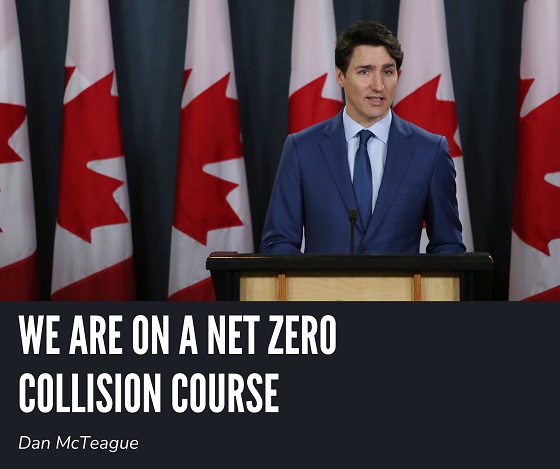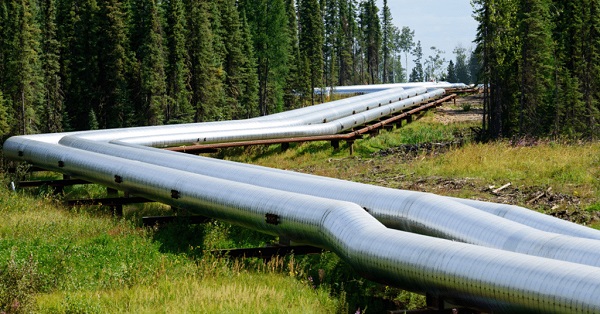Dan McTeague
We are on a Net Zero collision course


Welcome to 2024 where the threat of looming power outages in a resource-rich, developed country is a reality. And we have Justin Trudeau and his ideologically-driven caucus to thank for it.
In the past month alone, Alberta has issued four emergency alerts warning consumers to reduce demand or the grid could face the risk of rotating power outages. Residents were urged in one alert to immediately limit their electrical use to essential needs only.
According to the Alberta Energy System Operator (AESO,) which manages the grid, the alert was due to sustained cold temperatures. Alberta’s grid is more vulnerable in the winter due to the decreased opportunity to generate solar power with the shorter days and of course because during extreme cold, there is usually less opportunity for wind power generation.
Thank goodness for hydrocarbons since over those days more than 80% of Alberta’s power came from natural gas and to a lesser extent, coal.
This situation in Alberta should serve as a warning for the rest of the country.
That’s because the Trudeau government is aggressively moving forward with their Clean Electricity Regulations which mandate that by 2035 the Canadian grid be zero emissions. This means the entire country will increasingly be reliant on unreliable energy sources.
And last month, the Trudeau Liberals implemented their Electric Vehicle Availability Standard, which mandates all new light-duty cars and trucks must be zero emission by 2035 as well. In other words, after 2035 forget about purchasing a new gas-powered car or diesel-driven truck. Welcome to Trudeau’s Net Zero world!
Many Canadians are wondering how we are going to produce the energy to power our cars along with everything else in our lives, especially in the depths of the cold winter months.
And the answer is simply, “we can’t.”
We are on a collision course of the Liberal government’s making. In their ideological zeal to achieve Net Zero, they seem to have been completely unhinged from reality.
As I like to remind people, Canada contributes 1.5% of global greenhouse gas (GHG) emissions. Even if we halted all use of fossil fuels in our country it would have no global effect on world CO2 levels.
We can see the consequences of this pursuit of Net Zero, in Europe. Germany has frantically put coal power back on the grid in order to meet electricity demand. The UK is slamming the breaks on EVs and stepping up North Sea oil exploration. Italy is spending billions trying to fill its energy gaps with natural gas from Libya.
We are staring down the barrel of an upcoming election and if we want to ensure our quality of life, we need a major course correction. This does not mean delaying the implementation of EV regulations, or emissions caps, or even simply pushing back Net Zero target dates.
No. We need a party that will stand up against Net Zero and its related policies. We need a government that will see that this is a suicide mission we need to abandon entirely, not simply punt down the road.
Let’s hope we don’t have to wait for the worst-case scenario before Canadians finally realize the standard of living and access to affordable energy cannot be taken for granted. We truly are on a collision course with reality, due to ideological government policies that will have a crippling effect on our economy and way of life.
Dan McTeague is President of Canadians for Affordable Energy
Automotive
Canada’s EV gamble is starting to backfire

Things have only gone from bad to worse for the global Electric Vehicle industry. And that’s a problem for Canada, because successive Liberal governments have done everything in their power to hitch our cart to that horse.
Earlier this month, the Trump Administration rolled back more Biden-era regulations that effectively served as a back-door EV mandate in the United States. These rules mandated that all passenger cars be able to travel at least 65.1 miles (and for light trucks, 45.2 miles) per gallon of gasoline or diesel, by the year 2031. Since no Internal Combustion Engine (ICE) vehicle could realistically conform to those standards, that would have essentially boxed them out of the market.
Trump’s rolling them back was a fulfillment of his campaign promise to end the Biden Administration’s stealth EV mandates. But it was also a simple recognition of the reality that EVs can’t compete on their own merits.
For proof of that, look no further than our second bit of bad news for EVs: Ford Motor Company has just announced a massive $19.5 billion write-down, almost entirely linked to its aggressive push into EVs. They’ve lost $13 billion on EVs in the past two years alone.
The company invested tens of billions on these go-carts, and lost their shirt when it turned out the market for them was miniscule.
Ford’s EV division president Andrew Frick explained, “Ford is following the customer. We are looking at the market as it is today, not just as everyone predicted it to be five years ago.”
Of course, five years ago, the market was assuming that government subsidies-plus-mandates would create a market for EVs at scale, which hasn’t happened.
As to what this portends for the market, the Wall Street Journal argued, “The company’s pivot from all-electric vehicles is a fresh sign that America’s roadways – after a push to remake them – will continue to look in the near future much like they do today, with a large number of gas-powered cars and trucks and growing use of hybrids.”
And that’s not just true in the U.S. Across the Atlantic, reports suggest the European Union is preparing to delay their own EV mandates to 2040. And the U.K.’s Labour government is considering postponing their own 2030 ICE vehicle ban to align with any EU change in policy.
It’s looking like fewer people around the world will be forced by their governments to buy EVs. Which means that fewer people will be buying EVs.
Now, that is a headache for Canada. Our leaders, at both the federal and provincial levels, have bet big on the success of EVs, investing billions in taxpayer dollars in the hopes of making Canada a major player in the global EV supply chain.
To bolster those investments, Ottawa introduced its Electric Vehicle mandate, requiring 100 per cent of new light-duty vehicle sales to be electric by 2035. This, despite the fact that EVs remain significantly more expensive than gas-and-diesel driven vehicles, they’re poorly suited to Canada’s vast distances and cold climate, and our charging infrastructure is wholly inadequate for a total transition to EVs.
But even if these things weren’t true, there still aren’t enough of us to make the government’s investment make sense. Their entire strategy depends on exporting to foreign markets that are rapidly cooling on EVs.
Collapsing demand south of the border – where the vast majority of the autos we build are sent – means that Canadian EVs will be left without buyers. And postponed (perhaps eventually canceled) mandates in Europe mean that we will be left without a fallback market.
Canadian industry voices are growing louder in their concern. Meanwhile, plants are already idling, scaling back production, or even closing, leaving workers out in the cold.
As GM Canada’s president, Kristian Aquilina, said when announcing her company’s cancellation of the BrightDrop Electric delivery van, “Quite simply, we just have not seen demand for these vehicles climb to the levels that we initially anticipated…. It’s simply a demand and a market-driven response.”
Prime Minister Mark Carney, while sharing much of the same environmental outlook as his predecessor, has already been compelled by economic realities to make a small adjustment – delaying the enforcement of the 2026 EV sales quotas by one year.
But a one-year pause doesn’t solve the problem. It kicks the can down the road.
Mr. Carney must now make a choice. He can double down on this troubled policy, continuing to throw good money after bad, endangering a lot of jobs in our automotive sector, while making transportation more expensive and less reliable for Canadians. Or he can change course: scrap the mandates, end the subsidies, and start putting people and prosperity ahead of ideology.
Here’s hoping he chooses the latter.
The writing is on the wall. Around the world, the forced transition to EVs is crashing into economic reality. If Canada doesn’t wake up soon, we’ll be left holding the bag.
Dan McTeague
Will this deal actually build a pipeline in Canada?

By Dan McTeague
Will Carney’s new pipeline deal actually help get a pipeline built in Canada? As we said before, the devil is in the details.
While the establishment and mainstream media cheer on the new pipeline agreement, there are specific details you need to be aware of.
Dan McTeague explains in his latest video.
-

 International2 days ago
International2 days ago“Captured and flown out”: Trump announces dramatic capture of Maduro
-

 International2 days ago
International2 days agoTrump Says U.S. Strike Captured Nicolás Maduro and Wife Cilia Flores; Bondi Says Couple Possessed Machine Guns
-

 Energy2 days ago
Energy2 days agoThe U.S. Just Removed a Dictator and Canada is Collateral Damage
-

 International2 days ago
International2 days agoUS Justice Department Accusing Maduro’s Inner Circle of a Narco-State Conspiracy
-

 Haultain Research2 days ago
Haultain Research2 days agoTrying to Defend Maduro’s Legitimacy
-

 Business2 days ago
Business2 days agoVacant Somali Daycares In Viral Videos Are Also Linked To $300 Million ‘Feeding Our Future’ Fraud
-

 International2 days ago
International2 days agoU.S. Claims Western Hemispheric Domination, Denies Russia Security Interests On Its Own Border
-

 Daily Caller1 day ago
Daily Caller1 day agoTrump Says US Going To Run Venezuela After Nabbing Maduro





